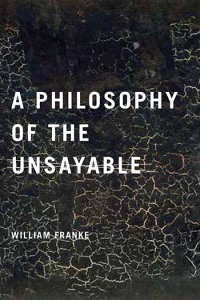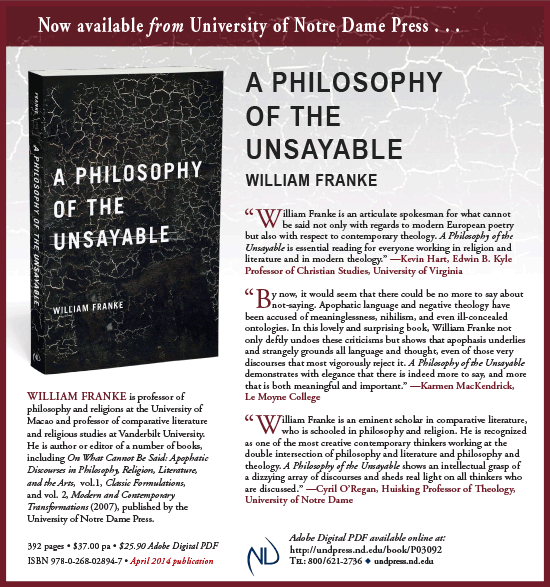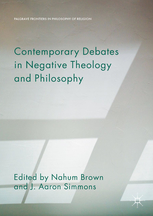A Philosophy of the Unsayable
Posted by frankewp on Tuesday, March 13, 2018 in News.
A Philosophy of the Unsayable

This monograph proposes an original philosophy pivoting on analysis of the limits of language and explains why the encounter with what exceeds speech has become the crucial philosophical issue of our time. It also offers readings of literary texts, especially the poetic oeuvres of Paul Celan and Edmond Jabès, in which the philosophical principles worked out on a theoretical plane are illustrated and put into practice. Finally, it engages with philosophical theologies and philosophies of religion in the debate over negative theology, demonstrating the irresistible infiltration of negative theology into the thinking even of those who attempt to deny or delimit it. Both extremes of Radical Orthodoxy and Secular Theology share in common not very fully acknowledged and sometimes explicitly repudiated premises in negative or apophatic theology, which surprisingly emerges as key to fostering genuine possibilities for dialogue among even the most antagonistic approaches to philosophical theology on the scene today.
From University of Notre Dame Press
“William Franke is an articulate spokesman for what cannot be said not only with regards to modern European poetry but also with respect to contemporary theology. A Philosophy of the Unsayable is essential reading for everyone working in religion and literature and in modern theology.” — Kevin Hart, Edwin B. Kyle Professor of Christian Studies, University of Virginia
“By now, it would seem that there could be no more to say about not-saying. Apophatic language and negative theology have been accused of meaninglessness, nihilism, and even ill-concealed ontologies. In this lovely and surprising book, William Franke not only deftly undoes these criticisms but shows that apophasis underlies and strangely grounds all language and thought, even of those very discourses that most vigorously reject it. A Philosophy of the Unsayable demonstrates with elegance that there is indeed more to say, and more that is both meaningful and important.” — Karmen MacKendrick, Professor of Philosophy (Joseph C. Georg Endowed Professorship of Philosophy, 2009-12), Le Moyne College
“William Franke is an eminent scholar in comparative literature, who is schooled in philosophy and religion. He is recognized as one of the most creative contemporary thinkers working at the double intersection of philosophy and literature and philosophy and theology. A Philosophy of the Unsayable shows an intellectual grasp of a dizzying array of discourses and sheds real light on all thinkers who are discussed.” — Cyril O’Regan, Huisking Professor of Theology, University of Notre Dame
“William Franke is a major voice in current discussions of “Religion and Literature.” One thing that makes him unusual, as well as highly valuable, is that unlike most people in the area he has a broad knowledge of philosophy, both ancient and modern; another unusual characteristic of this author is that his writing is firmly based in meticulous scholarship in several European languages. I have long been an admirer of his work, and I am pleased to say that the substantial typescript I have been given to read, A Philosophy of the Unsayable, has all the desirable qualities I have just indicated. There is one further quality that makes Professor Franke an author that Notre Dame University Press will want to retain: he writes a remarkably clear and engaging prose.”—(Senior scholar writing anonymously for UNDP)
INTERNET FORUMS
Martin Shuster, Realism and Ineffability
Boston University IPR Blog: Silence and Resilience in Suffering
REVIEWS:
“William Franke has emerged as our foremost purveyor of what cannot be said.. . .this is a remarkable text, and deserves close attention at every level. Like all important texts, it raises questions for further interrogation.”
– Andrew W. Hass, editor of Literature and Theology (Oxford University Press).
Andrew W. Hass, Literature and Theology
“Franke’s book is . . . a thoughtful, provoking and often helpful exploration of an intellectually and spiritually demanding discourse.” George Pattison, Theology 111 (2): 144-46
George Pattison, Theology
Brett Gray review of A Philosophy of the Unsayable (PDF):
“Ultimately, what Franke seems to be questing for in his “philosophy of the unsayable” is the possibility of a form of faithful and non-nihilistic pluralism. If all discourses, preeminently theological discourses, find their true orientation towards something that cannot be said, but something which nonetheless elicits a frequently prolix and often doxological linguistic saying, then all discourses have a hidden unity beyond their irreducible differences. That is not an immanently obtainable unity, but a unity in distension towards what cannot, by its very nature, be obtained. It renders language both chastened and noble: chastened by its limits, and ennobled by its endless quest. Likewise, the apophatic thinker-whether a French philosopher or a theolo- gian steeped in the knowledge of Christian mysticism—is to Franke a “knight of faith” (p. 328) who restlessly probes the possibilities of believing through an ardent ascesis of questioning, whether such a knight is more Galahad or Don Quixote will probably be for the reader to decide, what they will not be able to dispute is the erudition and audacity of Franke’s own quest.”
–Brett Gray, Anglican Theological Review 99.1 (2017): 145-148
Reviewed in the United States on August 20, 2022
Syndicate online Symposium
A Philosophy of the Unsayable

Symposium Introduction
by Kendall Cox
In A Philosophy of the Unsayable, William Franke examines the “valences and varieties” of what cannot be said—from the indeterminacy of language to the infinite openness of thought to the ineffability of the divine and the unspeakability of suffering. The work reflects Franke’s depth of study across the fields of philosophy, theology, and literature as a professor of Comparative Literature and Religious Studies at Vanderbilt University and of Philosophy and Religions at the University of Macao. Here he condenses and clarifies some of the main themes and assertions of his two edited volumes On What Cannot Be Said: Apophatic Discourses in Philosophy, Religion, Literature and the Arts (2007). Both projects draw attention to “apophasis” as a distinct genre that spans a host of related disciplines. Franke’s concern is to identify and set in conversation certain resources in the Western intellectual tradition that figure as “a kind of perennial counter-philosophy to the philosophy of Logos” (1). “Apophasis” specifically designates, for him, the “negation”—namely the “self-negation”—of discourse (80). Franke discerns within discourses as manifold and varied as Neoplatonism, negative theology, medieval mysticism, Romantic poetry, Death of God theology, Radical Orthodoxy, and especially contemporary continental philosophy “major monuments” of what he calls an “apophatic culture” (2). He concludes the work with the claim that “apophaticism is the soul of philosophy inasmuch as it critically questions everything that can be believed” (328).
In the first few chapters of A Philosophy of the Unsayble, Franke examines the theme of unsaybility in literature. Peppered with epigraphs and insights from literary figures such as Shakespeare, Rilke, Hölderlin, Dickenson, Beckett and many others, in these initial theoretical and literary-critical reflections, Franke turns to Hegel and post-Hegelian philosophy (chapters 1-2) as well as the “pathbreaking” post-holocust poetry of Paul Celan and Edmond Jabès (chapter 3) (83). In the second half of the book, Franke more explicitly examines the relationship between philosophy and theology, enacting the “trans-philosophical thinking” he commends (5). One of his goals is “to situate apophatic thought as key to some of the most challenging developments and disputes in the philosophy of religion today” and “to mediate and unblock the deadlock between secularizing…and theologizing approaches” (274). He attempts to bridge discourses as apparently polarized as the “postsecular religious revivalist philosophy” (or Radical Orthodoxy) of figures such as John Milbank, Catherine Pickstock, and Graham Ward, on the one hand, and the secular or atheistic philosophy of Thomas Altizer, Slavoj Žižek, Alain Badiou, Giorgio Agamben, and John Caputo, on the other (chapters 4-7). Franke says these discourses have a “common basis in critical, apophatic insight” (270). Apophasis is “the missing link.
The way Franke relates philosophy, theology, and literature is a common thread in the responses comprising this symposium on his work. Franke believes that in the face of “what cannot be said,” 1) philosophy “necessarily becomes literary” and 2) language is pushed “in a direction which is best understood as theological” (4).
Sai Bhatawadekar highlights the performative quality of a “philosophy of the unsayable,” integrating humor, hymnody, as well as some of her own aphoristic rhymes into her response. Bringing together modern German philosophy and South Asian Studies, Bhatawadekar’s engagement with Franke is set against the backdrop of her upbringing in a Hindu household where, she says, the “bizarre appearances” of various gods and goddesses represented “very imaginative yet ultimately feeble attempts of depicting something beyond human capacities.”
Kevin Hart, himself a theologian, philosopher, and poet, is well aware of the sorts of resonances Franke identifies across these distinct discourses. However, he is wary of collapsing the differences between the contemplative practices of medieval mysticism and, for example, the brokenness of language that marks post-Holocaust German literature. Hart suggests teasing out more thoroughly the various “modes” in which unsayability “impinges on us.” He also notes the fact that apophasis “is ineluctably tied to” kataphasis—a point Aaron Simmons makes as well. Writing from the perspective of modern philosophy of religion, Simmons raises a number of other important questions, including whether the “ground between philosophy, literature, and religion” might “be made a bit less slippery” and whether the discussion would benefit from a broader engagement with analytic philosophy and epistemology.
In light of the poetic and theological quality of Franke’s writing, Stephen Palmquist specifically considers the question of whether it is “properly named philosophy.” He believes Franke’s claims about apophatic language could be grounded more clearly in an apophatic logic that can make “sense out of language that might otherwise appear to be but a literary game.” William C. Hackett too draws attention to the problem of language and identity. His response to Franke takes the form of an extended reflection on Aristotle’s understanding of metaphor in light of Franke’s criticism that metaphysics has been “interpreted narrowly as a deductive system and without regard for its allusive and largely poetical power of vision” (39). Hackett, like Franke and some of the other panelists, notes the close affinity between the kind of apophatic questioning Franke describes and religious commitment. But Hackett wonders whether Franke’s valorizing of “leaving the question of religion undecided” (269) is itself “an a priori decision constricting the possibility of divine revelation” such that “the a priori character of (absolute) indecision” becomes a nihilistic “affirmation of the impossibility of a last word.”
In all, one of the most valuable dimensions of the book that surfaces in this symposium is the profound connection between thought and life within Franke’s “philosophy of the unsayable.” It embodies the fact that, in Simmons’ words, at its best “philosophy is itself lived engagement.”
Panelists
Christopher Hackett
Stephen R. Palmquist
J. Aaron Simmons
Kevin Hart
Sai Bhatawadekar
About the Author
William Franke is professor of philosophy and religions at the University of Macao and professor of comparative literature and religious studies at Vanderbilt University.
COMMENTARIES
SYMPOSIUM EDITOR
Project Muse Search Browse Download
Comment by Ronald L. Hall, International Journal for Philosophy of Religion (2013) 73:1–3 3, on component article,
“Apophasis as the Common Root of Radically Secular Radically Orthodox Theology
pdf
Franke_PhilosophyOfUnsayable_Announcement

For detailed critical engagement by 14 philosophers and cultural critics, see:
Contemporary Debates in Negative Theology and Philosophy
includes Kevin Hart chapter on William Franke’s philosophy of the unsayable





©2026 Vanderbilt University ·
Site Development: University Web Communications